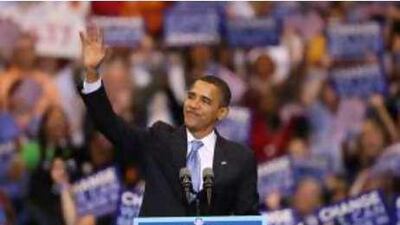This summer's news events unspooled like a Cold War retrospective. The Beijing Olympics, with its lavish opening ceremonies and the host country's prepubescent, bio-engineered gymnasts, recalled the days when the world's greatest athletes were doped-up pawns in an epic superpower rivalry. The death of the dissident author Alexander Solzhenitsyn offered a nostalgic prelude to Russia's assault on Georgia, which was met with a countervailing US rage and European reticence that resembled the West's empty response to the Soviet invasions of Hungry and Czechoslovakia. Last week, Syrian President Bashar alAssad popped up in Moscow to leverage Russian and US tensions, as if in parody of a Cold War supplicant.
In the US, Democratic leaders are worried their party's convention in Denver this week will erupt in violent demonstrations of a ferocity not seen since its notorious Chicago conclave 40 years ago. Then, as now, a hugely unpopular president loomed like a spectre caked in the mire of an unnecessary war. No wonder Democratic presidential candidate Barack Obama's mantra for change has resonated globally. So obsessively has President George W Bush embraced the rhetoric and postures of the Cold War that he seems to be dragging the rest of the world down with him, the way minor vessels get sucked into the maelstrom of a foundering tanker ship. That includes the beleaguered US economy. By the time Mr Bush has retired to his Texas ranch, coaxing his mountain bike through imaginary competitions with his residual security detail as imagined competitors, the next president will be waist-deep in the consequences of his predecessor's Cold War economy.
Republicans used to be the party of financial discipline. During his two terms, for example, Dwight Eisenhower ended a war on the Korean Peninsula before it could ignite into a nuclear exchange. He enforced racial integration in southern schools and he built the interstate motorway system. And he did it on a balanced budget. That changed with the arrival of Ronald Reagan in the early 1980s, who made deficit spending and budgetary flim-flam a Republican trademark. It took a Democrat, Bill Clinton, to manage a decade of budget shortfalls into a surplus. Under Mr Clinton, discretionary spending - the share of the budget that is negotiated on a yearly basis, rather than mandated by law to provide such benefits as Social Security - averaged a mere 2.3 per cent of gross domestic product annually. That's compared to a 7.9 annual average since the end of the Second World War.
Under Mr Bush, that figure has hovered at nearly 10 per cent, according to the Office of Management and Budget. Defence spending has driven the increase, but non-defence discretionary spending has risen by more than 34 per cent. Given how Mr Bush and the Republican party controlled Congress for the first threequarters of his two-term administration - Mr Clinton had to contend with a divided legislature for much of his eight years in office - it's hard to blame such extravagance on tax-and-spend liberals. The budget deficit, meanwhile, is projected to hit a record US$482 billion (Dh1.77 trillion) when fiscal year 2009 begins in October, about a fifth higher than earlier estimates. Bush's economic doctrine - wage war, cut taxes, spend like crazy - has less in common with Eisenhower's austerity than with his fellow spendthrift Texan Lyndon Johnson, who tried to finance the war in Vietnam along with massive social programmes. The result was fiscal disaster.
Which brings us back to the future. With both presidential contenders committed to sustaining Mr Bush's Cold War delusion - "We are all Georgians now," Republican John McCain said as Russian tanks roared toward Tiblisi, riffing off John F. Kennedy's 1963 "Ich bin ein Berliner" speech at the Berlin wall - the budget-busting militarisation of US foreign policy is all but complete. And here's the rub: non-discretionary spending, the annual outlay for Social Security, Medicare and Medicaid, America's three largest entitlement programmes, has roughly doubled over the last half century, to two-thirds of the federal budget. To fund both discretionary and non-discretionary commitments at their current growth rate for another 50 years would require Congress to raise taxes until they reach the equivalent of $11,000 per household, according to the Heritage Foundation, a conservative think tank in Washington. Otherwise, spending on the big three is projected to squeeze out the entire non-defense discretionary budget by 2020, and the entire discretionary budget, including defence, by 2034.
At that price, Mr Bush's concocted Cold War may wind up with the capitalists, if not capitalism, on the losing end.

